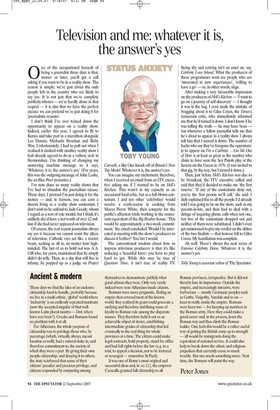Ancient & modern
These days we find the idea of an exclusive citizenship hard to handle, probably because we live in a multi-ethnic, 'global' world where `inclusivity' is an endlessly repeated mantrum (now the accepted singular of that wellknown Latin plural mantra — Dot, where have you been?). Greeks and Romans found no problem with it at all.
For Athenians, the whole purpose of citizenship was to privilege those who, by parentage (which, virtually always, meant location as well), had a natural stake in, and therefore commitment to, the society of which they were a part. By giving their own people citizenship, and denying it to others, the state reinforced that sense of their citizens' peculiar and precious privilege; and citizens responded by competing among themselves to demonstrate publicly what good citizens they were. Only very rarely indeed were non-Athenians made citizens.
Romans were more pragmatic. Ruling an empire that covered most of the known world, they realised its grant could generate a unifying and therefore stabilising sense of loyalty to Roman rule among the disparate masses. They therefore held it out as an achievable object of desire, establishing intermediate grades of citizenship that led eventually to the real thing for whole provinces at a time. The citizen could make legal contracts, hold property, stand for office and had full rights before the law (e.g. to a trial, to appeal a decision, not to be tortured or scourged — remember St Paul).
It was one of Rome's most original and successful ideas and, in AD 212, the emperor Caracalla granted full citizenship to all Roman provinces, irrespective. But it did not thereby lose its importance. Outside the empire, and increasingly intrusive, were barbarians — mostly Germanic peoples such as Goths, Visigoths, Vandals and so on — keen to settle inside the empire. Romans were keen too — for keeping up numbers in the Roman army. Here they could make a good career and, in the process, learn the Roman way and thus climb the Roman ladder. One feels this would be a rather useful way of getting the British army up to strength — all would-be immigrants doing the equivalent of national service. It could also help to break down the ethnic and religious prejudices that currently cause so much trouble. But one needs something more. Next time, the Romans will point the way.
Peter Jones

































































 Previous page
Previous page